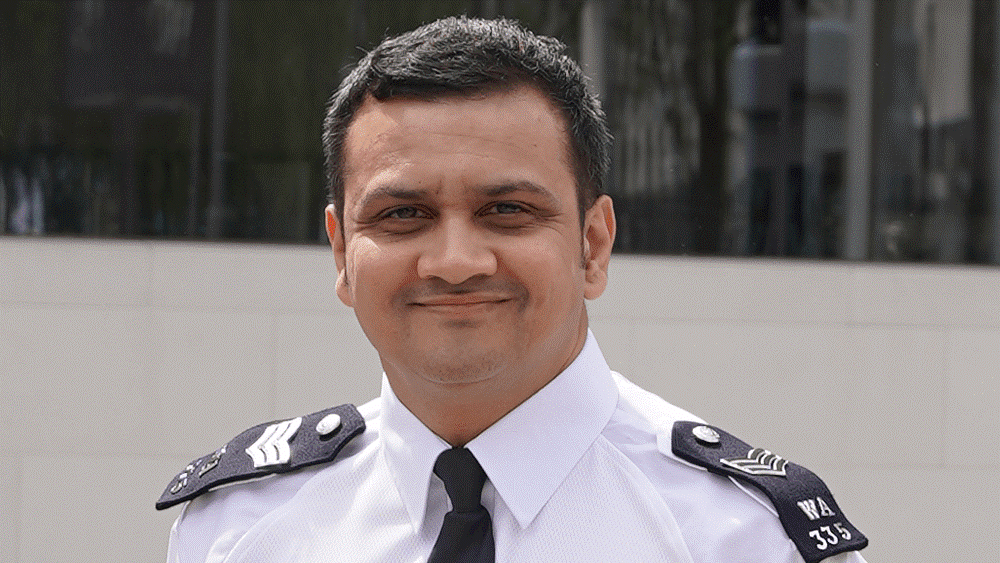Sergeant Keyur Patel
It's an amazing feeling, knowing you're helping another human being.

In 2012, Keyur Patel was diagnosed with Chronic Myeloid Leukaemia, a rare condition that means he’ll be on chemotherapy for life. But that didn’t stop him joining the Metropolitan Police just a year later. Now the Chair of the Cancer Support Group within the Met, he provides invaluable support to colleagues living with cancer.
We spoke to Keyur to learn more about the challenges he’s faced throughout his policing career.
What made you want to join the police?
I never had a desire to become a Police Officer, quite the opposite. Growing up in the 1990s, I didn’t view the police in a positive light. When I left the private sector in 2007, I knew I wanted to make a difference in the world. I initially looked at policing but my friends put me off the idea, saying there were better ways to make a difference, so I chose the social field. I worked in prisons supporting adults with their drug and alcohol addictions. I then moved into the community setting and started working in partnership with the police, and that’s where I saw a different side to policing.
I still wasn’t sure I wanted to be a police officer, despite sergeants telling me that I should. Instead, I became a Special Constable with Thames Valley Police. As soon as I put on the uniform, I knew this was my vocation. I felt that, as a police officer, I could hopefully engage with young people early on and help to steer them away from negative choices.
What did your friends and family think of you becoming a police officer?
My family would regularly say “but aren’t the police racist?”, to which I would try and explain that my personal experience was the opposite of that. They were still worried for me. However, their view is different now, mainly because I’ve spent time and patience explaining the real side of policing.
What barriers do you think stop people from your community applying to join the police?
I think particularly for the South Asian Community, they don’t see joining the police as a career path. A lot of South Asian families encourage their children towards other fields, such as medical and business professions, and I believe we could overcome this by demonstrating the varying roles available in the police service.
I think we need to do more to understand why people from Black and Asian communities wouldn’t consider a police career, and work even harder to break down barriers and truly listen to these communities.
Another big challenge is that there simply aren’t enough officers at senior ranks from under-represented communities.
What do you enjoy most about your role?
For me, it’s three aspects:
- Working with the public and working together to make our communities safer.
- Supporting and helping victims of crime. When I spent three years in the Community Safety Unit, it was a really challenging role as I saw victims of domestic abuse. But it was an amazing feeling knowing you were helping another human being.
- Helping young people. This is another passion and one of my most rewarding roles was working in Continuous Policing Improvement Command within the Schools Engagement and Youth Strategy.
Now, as a Sergeant, my main goal is supporting other officers to develop, whether it’s laterally or through promotion.
Any key moments in your police career where you feel you made a real difference?
I dealt with a domestic violence case where the victim had been seriously assaulted. The suspect denied the offence, but while the suspect was in custody, I worked with the Independent Domestic Violence Advisors and other external partners and managed to get the victim and their child to a refuge. The most important thing was that the victim was safe. Such a brave and incredible person. This experience will always stick with me.
Have you had to overcome any big challenges in your career?
Before becoming a police officer, I was diagnosed with Leukaemia. I have a rare condition which means I’m on chemotherapy for life and I work out to keep my body active.
The other major challenge was passing the National Investigators Exam and National Police Performance Framework exams. I consistently got low marks across the board. After a discussion with an Inspector, she advised me to see if I had dyslexia. And in 2019 I was diagnosed - I received support from the Dyslexia Support Group and they helped me understand that my condition didn’t mean I wasn’t intelligent, I just had different skills. With this knowledge and support, in 2021 I passed the exams.
Now, I feel humbled and happy to be able to go back to my original Borough (BCU) as a Sergeant and that I can be operational once again.
If you could give one key piece of advice to new police recruits, what would it be?
Don’t shy away from jobs. You’ll learn something from every aspect of your probation. You’ll become a great police officer if you have a well-rounded view of policing. This means time on Emergency Response Police Teams, time in Safer Neighbourhoods and in Investigations. Don’t think one aspect is more important than the others.
Want to hear from other serving officers?
Explore other officers’ stories on why they joined the force and what policing means to them.
